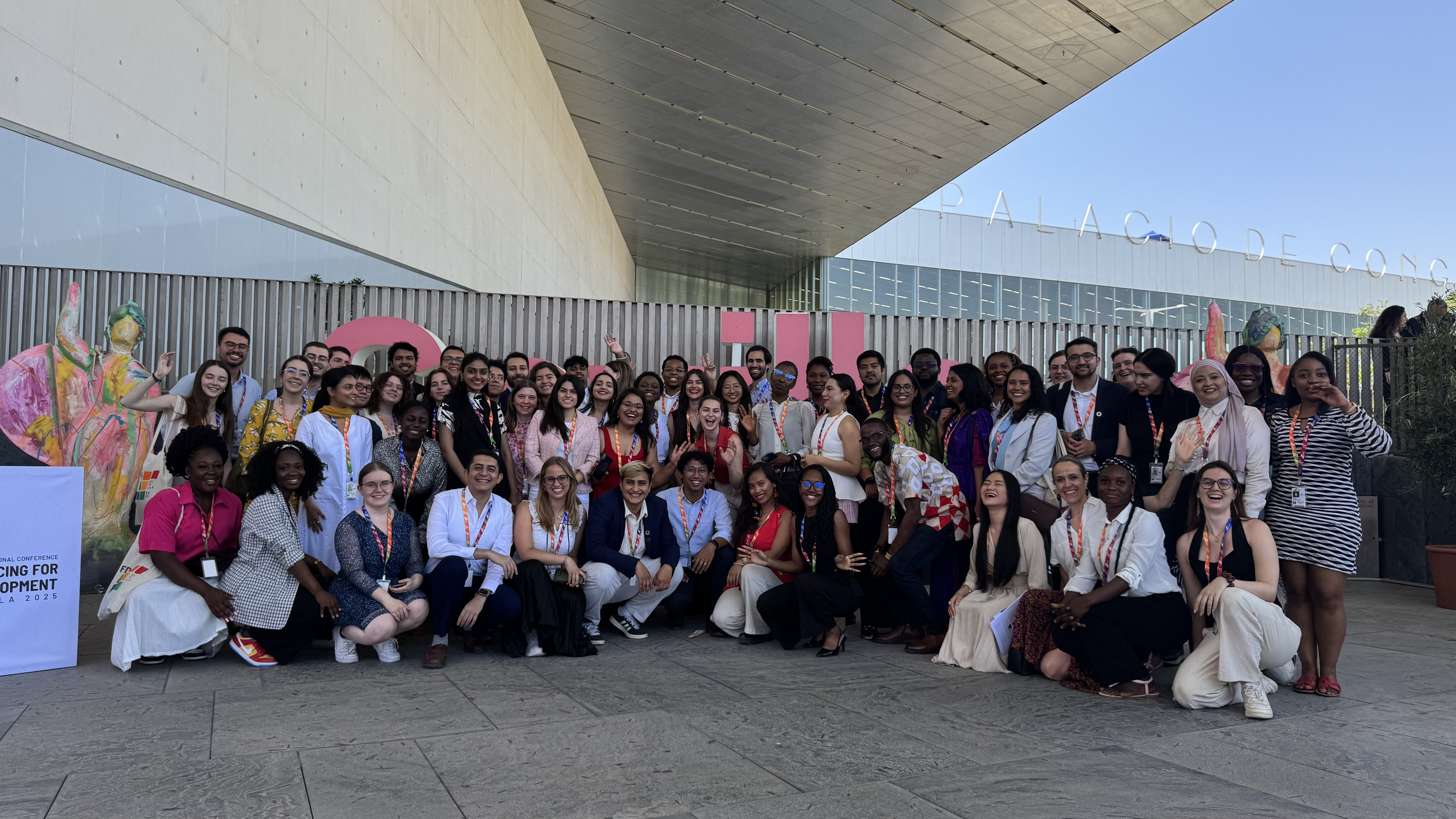This International Youth Day, we want to celebrate all the young advocates fueling our movement to keep having hope, to keep being loud, and to keep holding leaders accountable! As the world confronts converging injustices on each corner, live-streamed genocide, worsening economic and cost of living crises, exacerbated gender-based inequalities and violence, and deepening impacts of climate change, young people are holding the line and demanding better.
We sat with Dina Chaerani, an influential feminist youth leader in SRHR advocacy from YIELD Hub, to hear from her insights and advocacy at the Seville Financing for Development Conference. Dina, otherwise known as SRHR Barbie, was a prominent advocate throughout both the Youth and Children Pre-Conference, the Civil Society Pre-Conference, and several Feminist Funding and SRHR side-events. Catch Dina’s Live recaps here.
The Fourth International Conference on Financing for Development (FfD4) brought together ministers of finance, foreign affairs, heads of state, multilateral banks, UN agencies, and civil society to build consensus on how to reform the global financial architecture to achieve the Sustainable Development Goals (SDGs). In a time of polycrises—climate collapse, debt distress, inequality, and care deficits—the 2025 FfD outcome document, the Compromiso de Seville, is expected to reshape policies on international taxation, debt, trade, climate finance, and public spending. This year’s objectives included strengthening sovereign debt reform, tackling illicit financial flows, mobilizing domestic resources, and securing increased, equitable investments in social protection, health, and gender equality.
“Where are the women in the decision-making spaces? We must disrupt the patriarchal economic ecosystem and shift the power within global financing.”
This conference marks a pivotal moment to reimagine how global financing systems can uphold human rights, gender equality, and sustainable development. If ministers of finance and foreign affairs fail to integrate gender equality, health, and sexual and reproductive health and rights (SRHR) into fiscal frameworks, these areas remain chronically underfunded. Yet, too often, these discussions remain disconnected from the voices of those most impacted: women, girls, and gender-diverse people—especially from the Global South. Civil society and feminist movements must bridge this gap—translating lived realities into compelling economic arguments, using tools like gender-responsive budgeting and cost-benefit analysis, and forming cross-sectoral alliances with climate, labor, and health justice movements.
“The FfD4 only happens once every decade, and this time, gender, health, and social protections are on the agenda. Debt relief, climate financing, and global macroeconomics are feminist issues – We need to ensure that our voices and our ideas are meaningfully considered and reflected in these political dialogues. Young people and CSOs are set up to be sidelined – same historic and typical tokenization or afterthoughts. To ensure inclusive and equitable outcomes, young feminists must be supported to lead and organize within these global policy spaces.” Dina said.
Young feminists bring a transformative lens that challenges traditional economic paradigms and pushes for people-centered, rights-based approaches to development. Their lived experiences, intersectional analysis, and bold visions are key to shifting from extractive and inequitable systems to ones that center justice, care, and dignity.
“We need to learn to speak in their language. They speak with the numbers, with ROI, we speak with lived experiences—our advocacy strategy has to shift.” – Dina said
“The anger and resilience among young feminists are contagious. It was encouraging to see so many prominent SRHR advocacy organizations in Seville, between the CSO and Youth pre-conferences. Even though there were limited opportunities to meaningfully advocate for gender equality and rights, civil society was present across the 500+ side events, advocating for intersectional issues: women’s rights and bodily autonomy, youth leadership and agency, climate justice, taxing the rich, social accountability and shifting resources and power back to communities. But the truth is, the funding cuts to the development sector, especially on gender and SRHR, cut many of in our sector a bit too close. The urgency, despair, and skepticism are real.”
In the last 6 months, the U.S. government’s abrupt suspension and dismantling of USAID, including a 90day funding freeze and termination of approximately 83% of its global aid programs, has had widespread and devastating effects on sexual and reproductive health and gender equality. Between 2020 and 2022, donor funding for family planning dropped by 6%, with several governments slashing official development assistance (ODA) budgets. The UK alone cut over £1 billion from its aid budget, leading to program closures across Africa and Asia. Germany has also cut about €1 billion, lowering the BMZ (development ministry) budget (10-13% less than 2024). France implemented a 39% cut in its ODA mission for 2025, amounting to a loss of nearly €2.3 billion compared to the previous year. These cuts risk depriving over 30 million women and girls of access to contraceptive services, maternal care, and gender-based violence prevention.
1. Follow the money! Who/what is getting funded? Who/what is left behind?
The Seville Platform for Action is a global blueprint to reform the international financial system to better serve people and planet. An open-access dashboard was launched to allow civil society and advocates to track ODA and how much is being allocated to which areas. (Unfortunately, not too much on gender, youth, or SRHR).
2. Amplify what young feminists are producing and PUSHing for:
To truly finance development, we must finance care, rights, and equality—and that means putting young feminist leadership front and center in Seville and beyond. Read the call to actions from the Youth Pre-Conference Call to Action and the Civil Society Forum Statement, demanding a feminist approach to economic governance, debt justice, and the financing of care and SRHR.
3. Fund young people and young women!
Evidence shows feminist movements are the single strongest force for gender equality, and funding them ensures more effective, inclusive, and accountable development outcomes. Listen here to our side-event demanding Feminist Financing.
